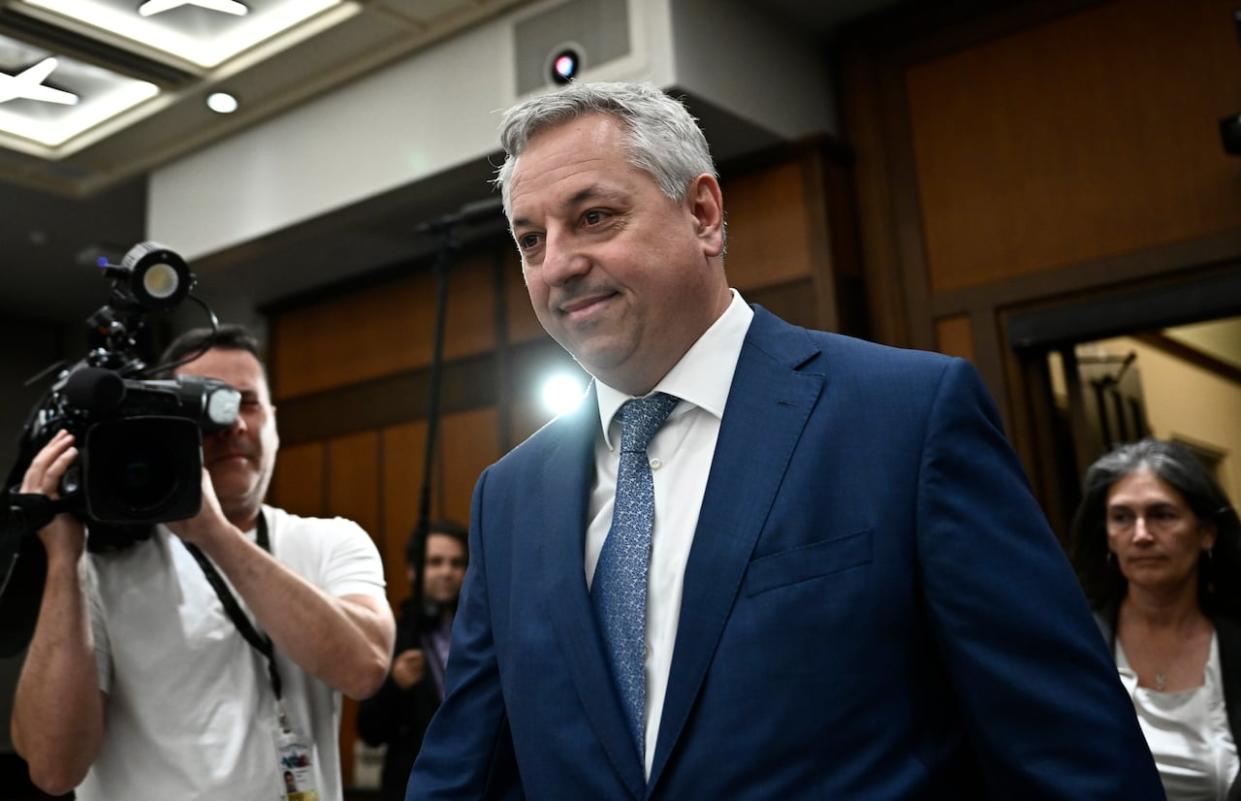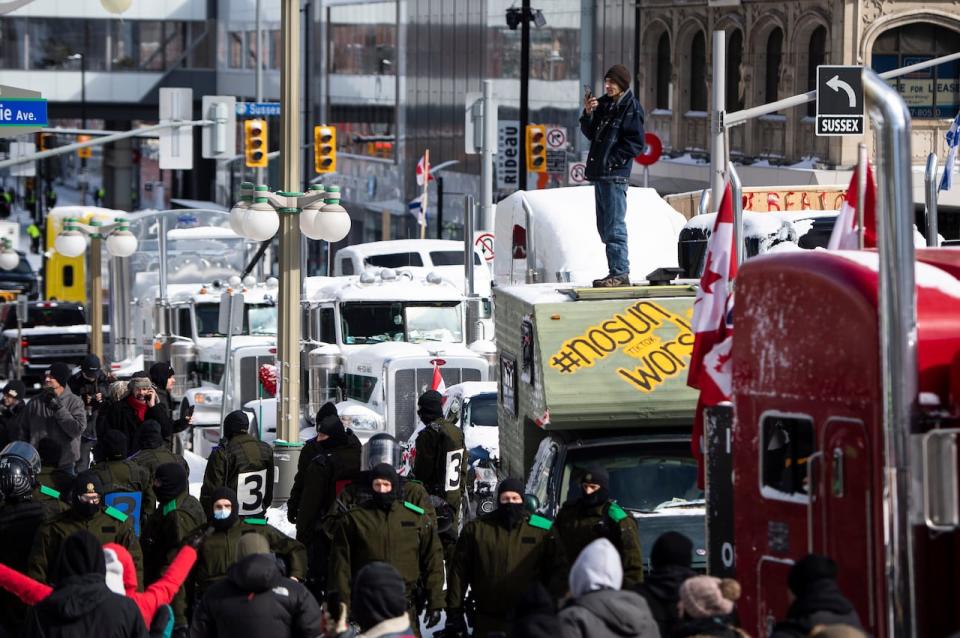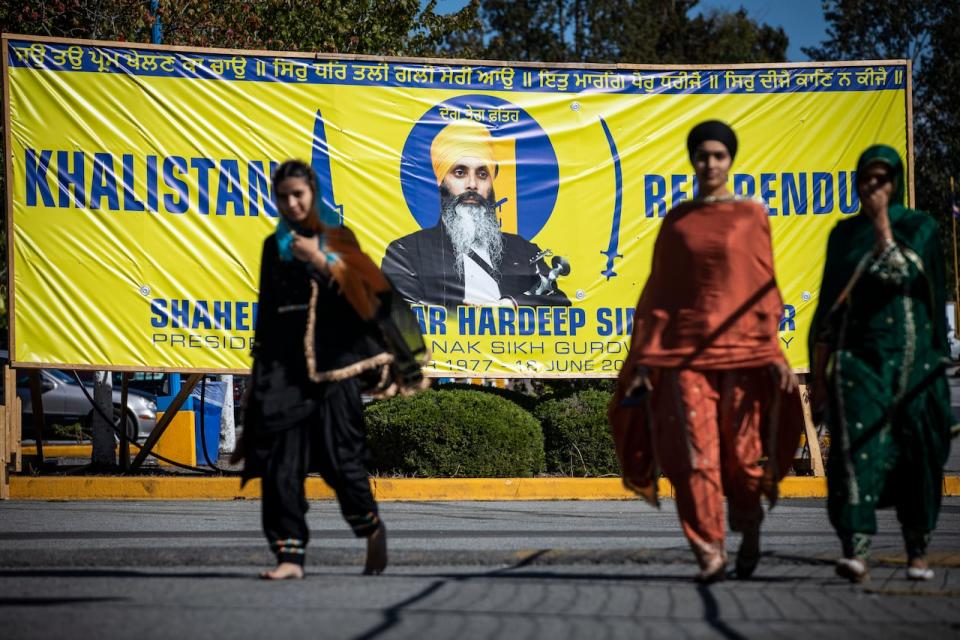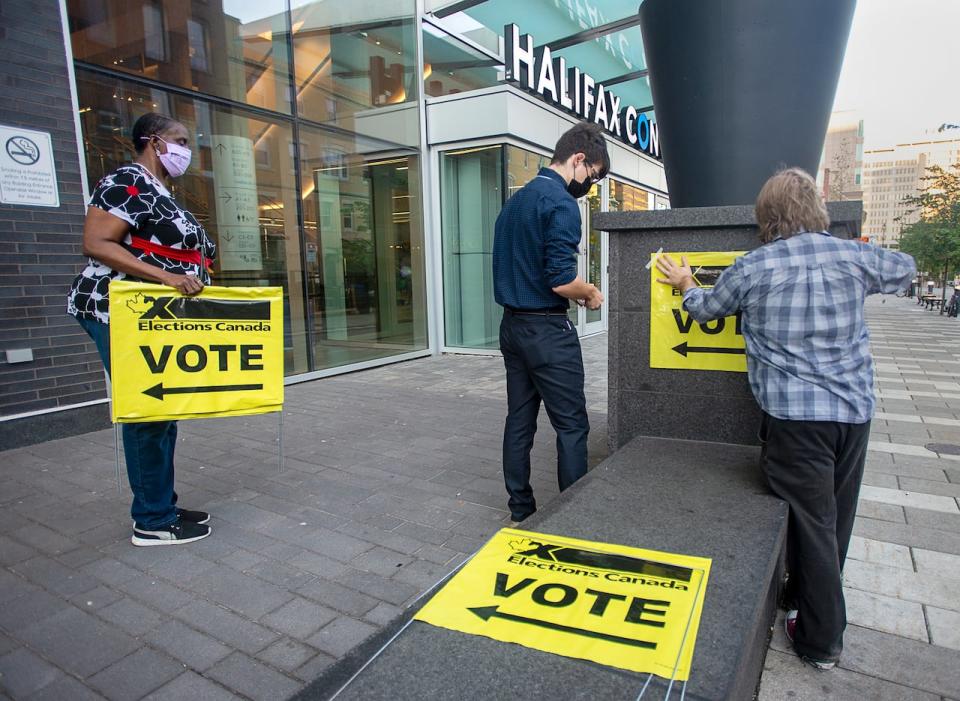Canada's top spy reflects on his uneasy year in the spotlight

The head of Canada's intelligence agency spent much of 2023 where spies don't like to be — in the spotlight, on the back foot.
Canadian Security Intelligence Service Director David Vigneault spent the first half of the year fielding questions about whether CSIS responded properly to Chinese election interference. He's ending the year facing questions about whether security services could have prevented the death of Hardeep Singh Nijjar, the Sikh activist India is accused of killing outside a temple in Surrey, B.C.
These questions cut directly to CSIS's reason for existing. So is Canada's leading intelligence agency still capable of keeping up with a bewildering range of threats both new and old?
"We are being challenged," Vigneault said during a sit-down interview with CBC in Winnipeg earlier this week.
Those challenges, he said, are affecting CSIS "in terms of recruitment, in terms of our authorities, but also in terms of our budget."
"With technology changes, our ability to collect foreign intelligence has diminished," he added. "In the context of geopolitical tensions, it is critical that we regain that."
Waiting for warrants
The director blamed many of the service's problems on CSIS's enabling law, the Canadian Security Intelligence Act, which was written in 1984. He said CSIS employees are handcuffed by a law drafted "when the fax machine was cutting-edge technology."
For example, he said, CSIS must secure a warrant from a judge to learn who is behind an online account — a process that eats up a lot of investigators' time.
"Back in the day, if you had a phone number, we could use the phonebook and see what was the name associated with that phone number," he said.
"Now, with IP protocol and IP addresses and social media communications, we have to use more intrusive powers to do that. And absolutely, we need a warrant. But the way that the CSIS Act is constructed now just makes it so time-consuming ..."
The federal government has launched consultations on whether the law needs to be updated to, for example, allow CSIS to share information about national security threats with people and institutions outside the federal government.
"It is a good time for Canadians to essentially make sure that their intelligence service is fit for purpose to protect them in this very challenging environment," Vigneault said.
Vigneault said one of the major factors holding his people back is how the law limits CSIS's use of data analytics. While he acknowledged safeguards are necessary, he argued the CSIS Act slows down the work of analysts tasked with making connections in the data.
Depending on where the data originated, he said, CSIS sometimes has to seek permission from the minister of public safety or a judge to retain, handle and review datasets. The intelligence commissioner also has to sign off on the minister's decision. It's a process CSIS says can delay data analysis by "up to six to nine months."

Protesters take part in the trucker convoy protest that gridlocked Ottawa for weeks during the winter of 2022. (Justin Tang/Canadian Press)
The director said the law's limits on datasets slowed down the work of the CSIS team monitoring the convoy protests that gridlocked Ottawa in early 2022.
"When some of the data about who was funding [the] convoy was leaked online, one of the top intelligence analysts in the country, understanding the phenomenon of radicalization, could not look at that data [right away]," he said.
"And at night, with his spouse, you know, they could look at if their family members, or somebody else they knew, was contributing to the cause. But as an intelligence analyst, top in the country, the limitation was there."
CSIS rocked by rape allegations
But an out-of-date enabling law isn't the only problem facing CSIS and its employees.
A recent investigation by the Canadian Press suggests an agency in turmoil. CP reported last month that an officer in the agency's B.C. surveillance unit said she was raped nine times by a senior colleague while in surveillance vehicles in 2019 and 2020.
A second officer told the news service she was sexually assaulted by the same man after CSIS supervisors were told he should not be partnered with young women.
CBC News has not independently verified those reports.
Vigneault apologized last week for what he called a "lack of empathy" in his initial response to the rape and bullying allegations. He said he is setting up an ombudsperson's office to handle workplace problems "without fear or reprisal." In a statement to staff, obtained by CBC News, Vigneault said the accused man "is no longer with the service."
Sitting in a back room at the Canadian Museum for Human Rights before delivering a public address earlier this week, Vigneault was asked whether internal harassment allegations have compromised the service's ability to confront security threats.
"It's a very fair question," he said. "Being ... the intelligence service of the country, I personally, and all the leaders in our organization, have a responsibility towards Canadians and toward our staff to make sure that we are not only discharging our critical mandate in the best, most effective possible way, but also in a way that entrusts confidence."
Vigneault said the agency has to have a "level of humility about ... our shortcomings" while informing Canadians "very clearly [about] how we are accountable and what steps we're taking to improve things.
"I can tell you that even with adversity, [CSIS staff] have been extremely dedicated and focused on their mission, which is to protect Canadians."
Vigneault responds to Nijjar murder
But the status of that mission is being questioned following Nijjar's death on Canadian soil.
Those questions multiplied when U.S. court documents revealed that American authorities had thwarted an assassination plot linked to India in their own territory — one with ties to Nijjar and a scheme to kill Canadians.
Vigneault said he couldn't discuss the nature of CSIS's involvement with Nijjar before his death. He did say that some information circulating in the public domain about the case is not "very accurate."
He also didn't answer when asked whether CSIS's restrictions on whom it can share information with played a role in Nijjar's case.

Members of the Sikh community gather at the Guru Nanak Sikh Gurdwara in Surrey B.C., where Hardeep Singh Nijjar was fatally shot. (Ben Nelms/CBC)
"I will not speak to the judicial process both in Canada and the U.S. But I can tell you that the information has been exchanged. And some information that is now public was maybe not available at the time of the murder of Mr. Nijjar," he said. "The prime minister has been clear and what we want him to be very clear about as well is, we need accountability.
"It's unacceptable that the Indian government was engaged in the murder of a Canadian on Canadian soil."
The recently unsealed U.S. indictment alleges that an Indian drug and weapons trafficker, working at the direction of an agent of India, was organizing the assassination of a target in the U.S. and then "three in Canada" afterward.
Vigneault wouldn't comment when asked whether there are people in Canada still at risk because of the alleged plot.
"I can tell you that CSIS, the RCMP and our other law enforcement colleagues are working around the clock to protect Canadians and that includes people who might be targeted by foreign entities," he said.
"But I will not be at liberty to speak in more details."
Election nomination campaigns a worry for CSIS
One of the most prominent political stories of the first half of the year dealt with how the Liberal government, and Canada's intelligence apparatus, handled Chinese election interference in the 2019 and 2021 elections. The criticism was touched off by reports from the Globe and Mail and Global News, largely based on confidential sources and leaked documents.
When asked if he has concerns about anyone currently serving in the House of Commons being compromised by foreign interference, Vigneault smiled and paused.
"Unfortunately, as I've said, I will not be able to speak in a lot of details," he said.
He did say the Chinese government's meddling efforts target "politicians at all levels of government, federal, provincial, and municipal, and also ... First Nations.

Elections Canada workers put up signage as they prepare for the polls to open in the federal election in Halifax on Monday, Sept. 20, 2021. (Andrew Vaughan/The Canadian Press)
"There are people who are being influenced unknowingly. And then unfortunately, we also have seen indications of people who have been witting in their activities."
Canada's response to election inference will be scrutinized by a public inquiry in the new year. Inquiry commissioner Marie-Josée Hogue is tasked with investigating whether China, Russia or other foreign actors tried to influence the past two federal elections.
The inquiry will also look at how intelligence flowed to decision-makers in the context of the past two elections.
CSIS's concern, Vigneault said, goes beyond the election period.
"That would include indeed the nomination campaigns, where there may be less scrutiny. The Elections Canada Act does not apply to the nomination process. And therefore it provides more opportunity for someone with intent to engage in those activities," he said.
Five Eyes informed on leak investigation
Both CSIS and the RCMP are investigating the leaks to the media about foreign interference.
Vigneault only smiled when asked if he knew who leaked the information.
He did say he's kept Canada's allies in the loop on the case.
"We are providing them with a level of information-sharing about what we have done," he said.
"We owe the people who are putting their lives at risk, our human sources, to protect their identity, their information. And we also owe our partners with whom we share so much sensitive information."
In March, the Globe and Mail published a piece written by the unnamed national security official who leaked key CSIS reports about China's interference in Canadian elections. The official wrote that the decision to leak did not come easily.
"Months passed, and then years. The threat grew in urgency; serious action remained unforthcoming," the source wrote.
"I endeavored, alone and with others, to raise concerns about this threat directly to those in a position to hold our top officials to account. Regrettably, those individuals were unable to do so."
The source wrote that they were motivated to speak out because "it had become increasingly clear that no serious action was being considered. Worse still, evidence of senior public officials ignoring interference was beginning to mount."
Despite the serious issues facing CSIS, Vigneault said he's ending in 2023 optimistic about what lies ahead.
"I do feel energized by the fact that we are having the right discussions," he said. "Canadians deserve that."

